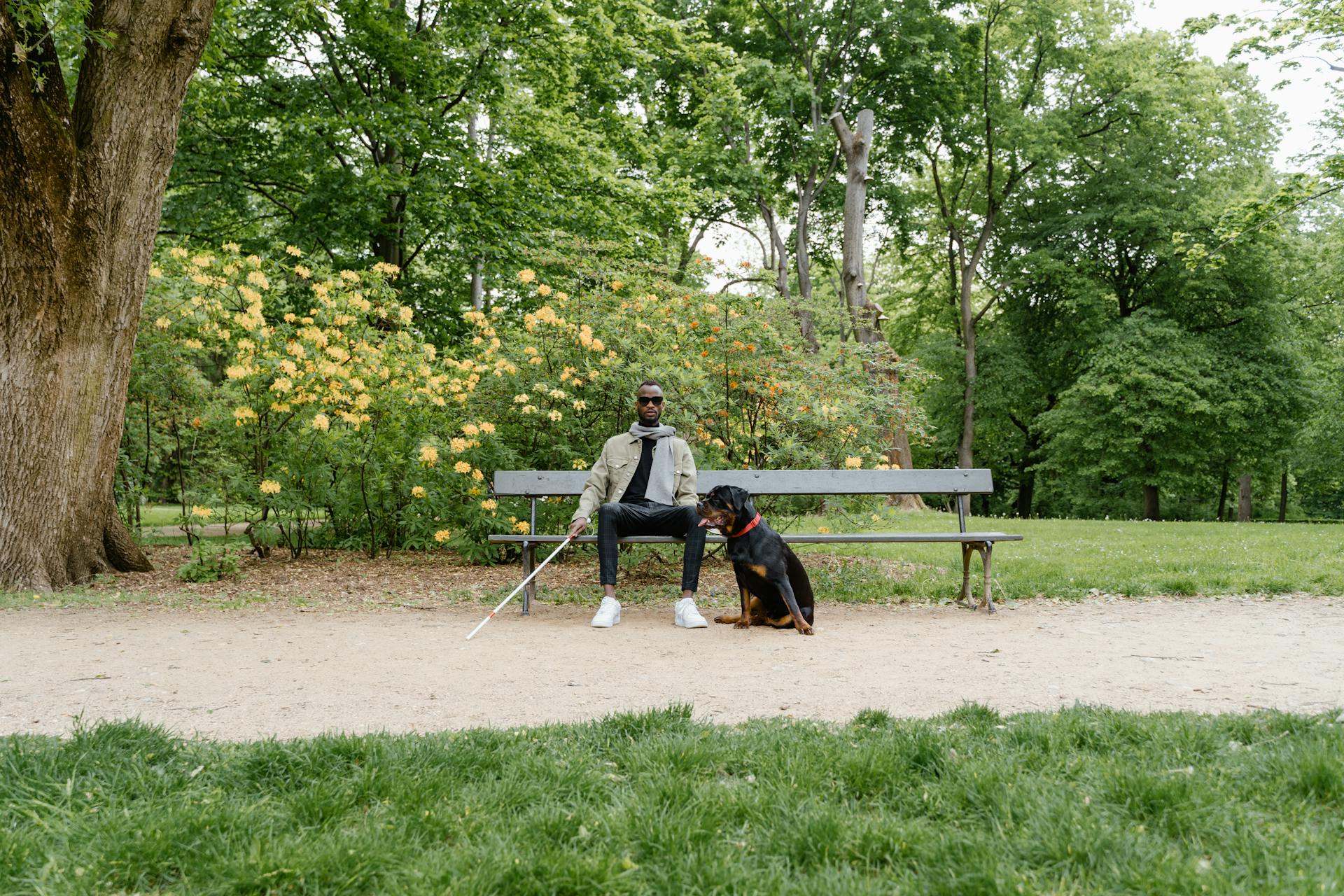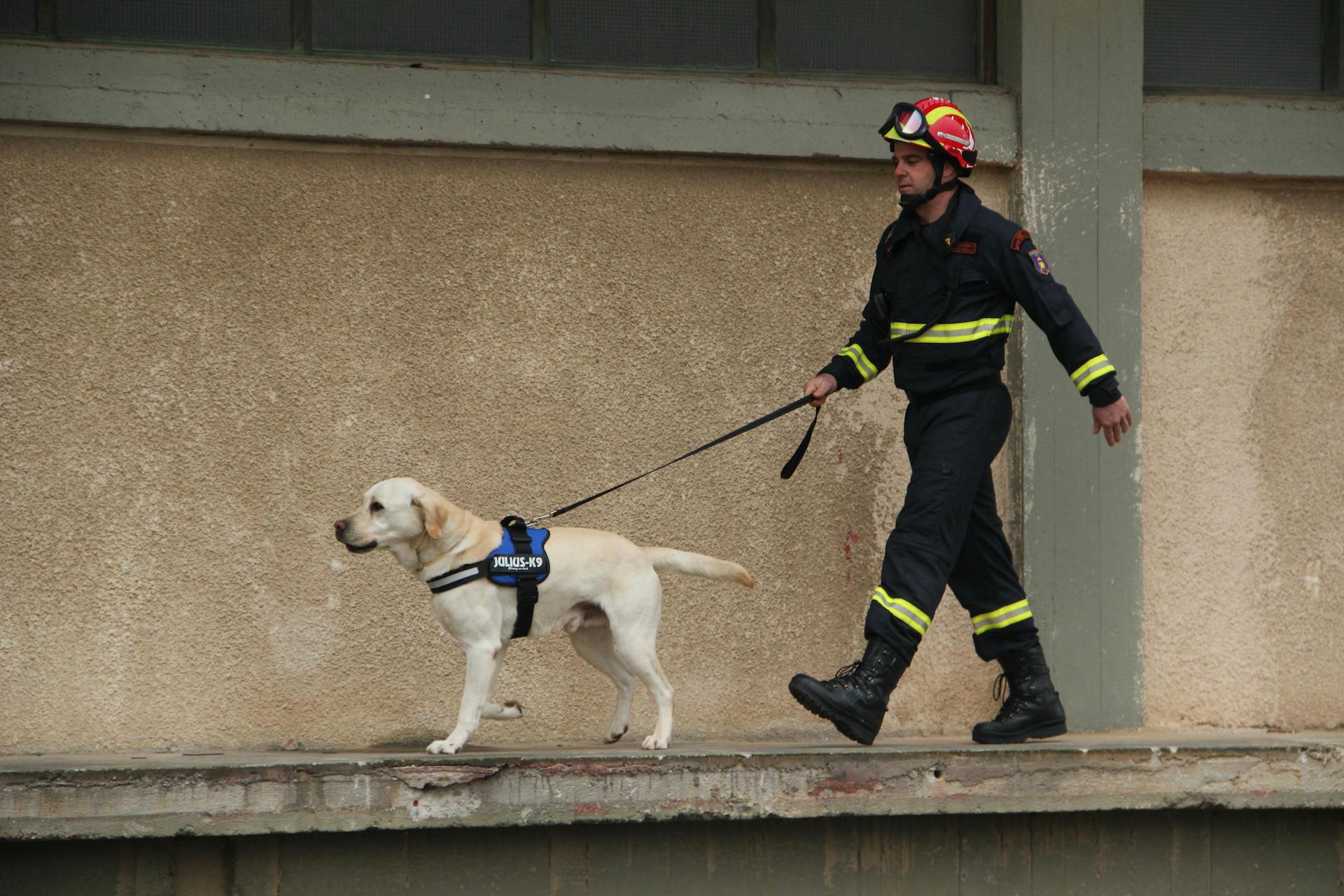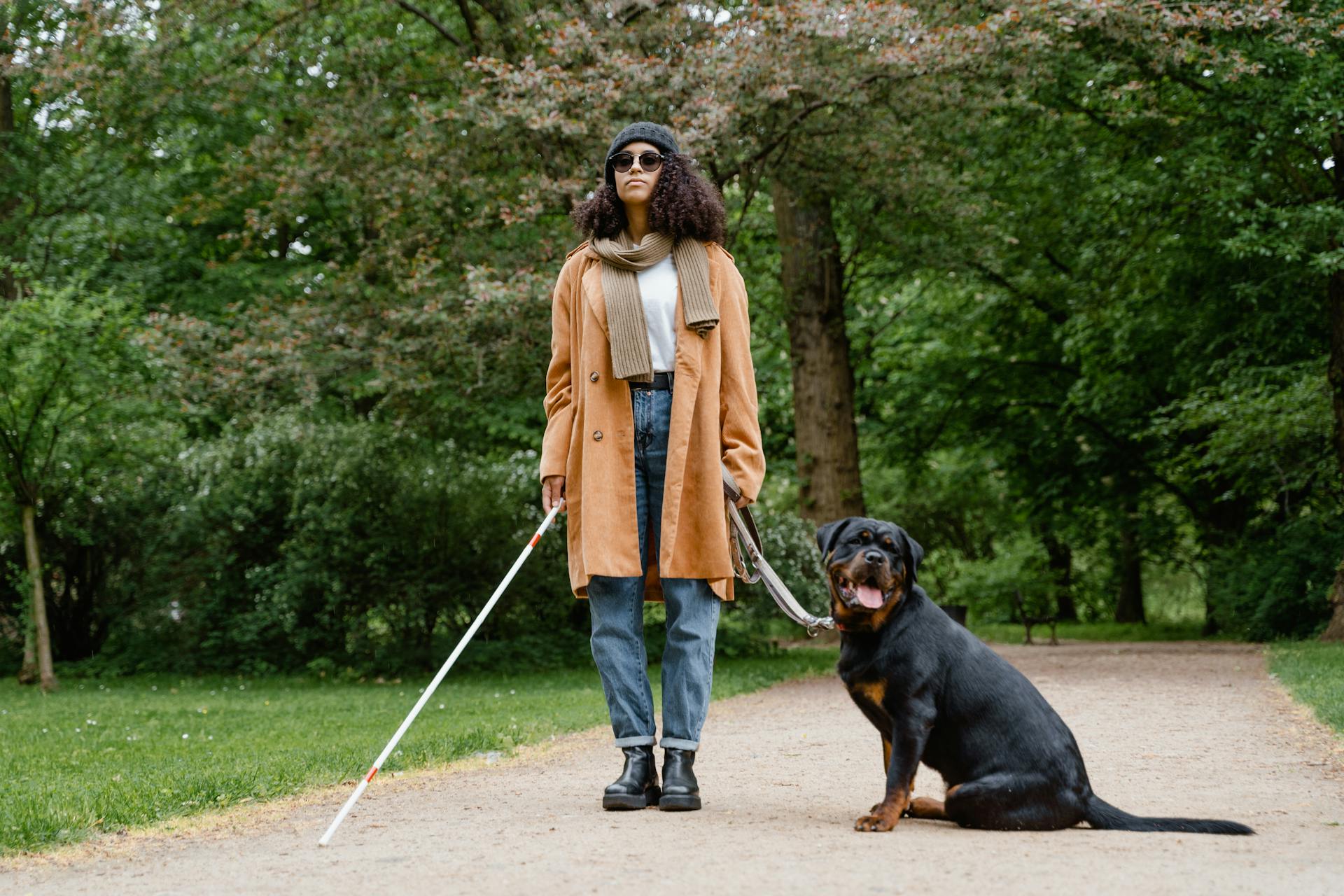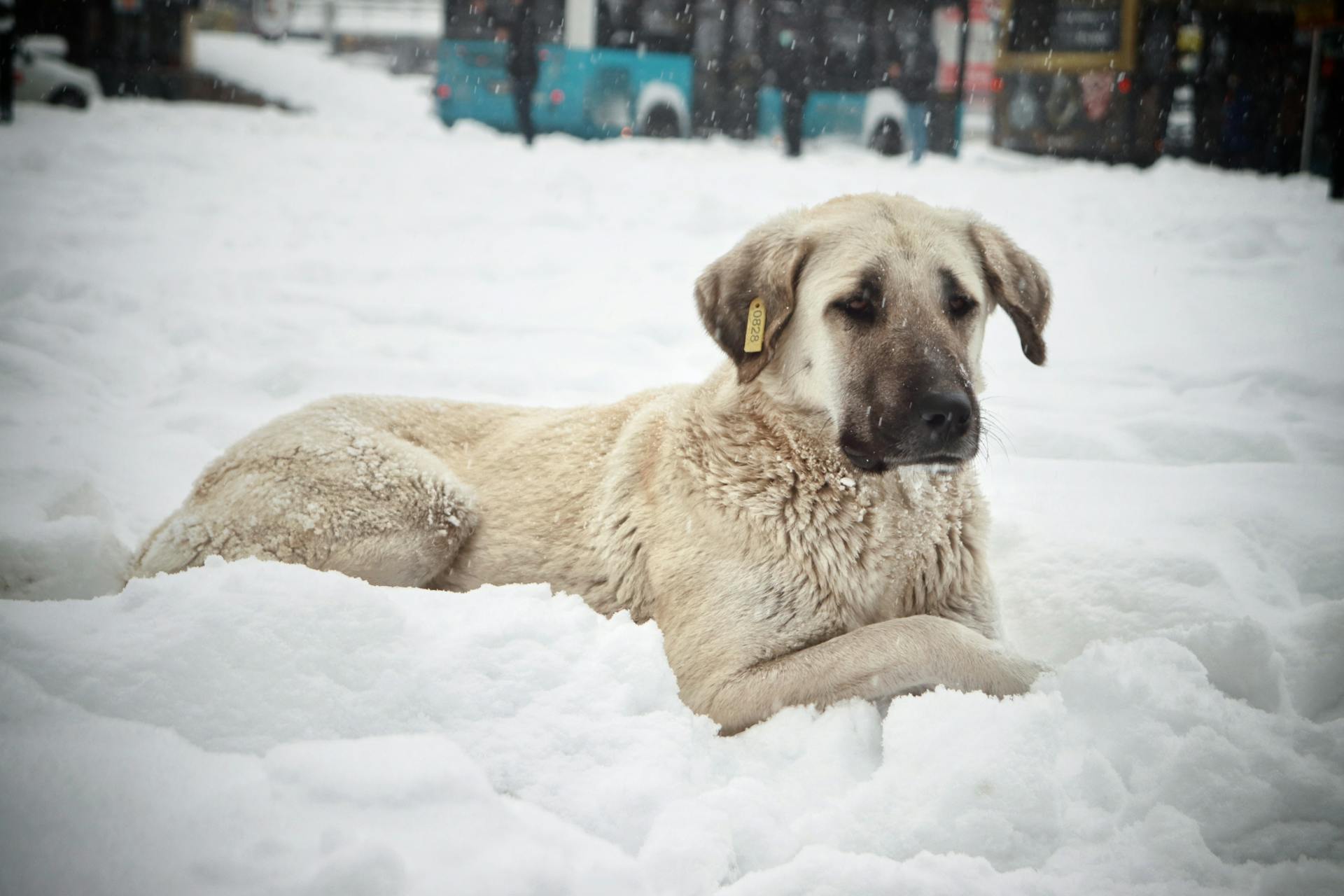
Restaurants can be tricky when it comes to service dogs, but they can't just refuse service to them. Under the Americans with Disabilities Act (ADA), businesses that serve the public must allow service animals to accompany their owners.
In the United States, service animals are defined as dogs that are individually trained to do work or perform tasks for people with disabilities. This definition is crucial because it means that emotional support animals or pets don't qualify as service animals.
Businesses can't ask for proof of a disability or require documentation for a service animal, but they can ask one question: is the dog a service animal required because of a disability?
A different take: Ada Law Service Dogs
Restaurant Service Dog Policies
Restaurants must allow individuals with disabilities to bring their service dogs onto the business premise in all areas customers are generally allowed.
Service dogs must be admitted for free, and restaurants may not impose any deposit, fee, or surcharge to admit a service dog, unless the dog causes damage.
Consider reading: Service Dogs in Restaurants California

However, restaurants are not responsible for the care or supervision of the service dog, nor are they required to provide food or a special location for the animal.
If a service dog misbehaves and poses a threat to the health or safety of others, the restaurant can exclude or remove it from the premises.
In such cases, the restaurant should give the individual with a disability the option of continuing to enjoy the goods or services without having the animal on the premises.
Service Dog Laws and Regulations
Service dogs are allowed to accompany people with disabilities into any privately owned businesses that serve the public, such as restaurants, hotels, and retail stores.
The American Disabilities Act (ADA) requires businesses to allow people with disabilities to bring their service animals onto business premises in whatever areas customers are allowed. This means that service dogs are permitted to go anywhere that the general public goes.
Check this out: Is a Public Access Test Required for Service Dogs

By law, a business is not allowed to ask you what your disability is, nor can they demand proof that your dog is "certified". Each state may have additional laws that provide protection to service dogs and the people they serve.
Service dogs are also legally permitted to travel on any public transit system with their owner, including buses, trains, boats, and planes. However, they must travel in the cabin with their owner, not in cargo.
Distinguishing Service Dogs
If you're unsure whether a dog is a trained service animal, you can't be 100% sure, but there are two questions to help you make a judgment call.
A restaurant may only ask two questions: "Is the animal required because of a disability?" and "What work has the animal been trained to perform?" If the individual responds "yes" to the first question and credibly describes the services performed by the dog, the patron and the dog must be admitted.

The tasks that service dogs are trained to perform are many, but generally they're related to the individual's disability. For example, a service dog might be trained to assist with navigation for someone who is blind.
Here are some examples of tasks that service dogs are trained to perform:
- Assisting with navigation (blindness)
- Assisting with stability and balance (mobility impairments)
- Alerting individuals to sounds (deafness) or allergens
- Pulling wheelchairs
- Carrying and retrieving items (mobility impairments)
- Seizure assistance
- Interrupting impulsive or destructive behaviors (psychiatric and neurological disabilities)
If the dog is not performing a specific task related to a disability, it's likely not a service animal.
Animal Care and Responsibility
As a restaurant owner, it's essential to understand your responsibilities when it comes to service animals. Businesses cannot require a person with a disability to show proof of a disability or certification of a service animal's status.
A service animal is not a pet, and its owner is solely responsible for its care and supervision. The individual with a disability must maintain control of the service animal at all times, whether through a harness, leash, or voice commands.
Businesses should not provide food, water, or a special location for the service animal. The owner is responsible for keeping the service animal clean and healthy, and following local vaccination and registration requirements.
Here are some key responsibilities of service animal owners:
- Maintain control of the service animal at all times
- Keep the service animal clean and healthy
- Follow local vaccination and registration requirements
By understanding these responsibilities, you can ensure a safe and welcoming environment for both your customers and their service animals.
Business Rights and Exemptions

As a business owner, you have the right to ask two questions when a service dog team enters your establishment: "Is this a service dog" and "what is it trained to do for you". You can't ask what the person's disability is.
You can also ask a service dog and its handler to leave if the dog is misbehaving, barking, soiling, or causing a disturbance. Business owners should be aware that there's no legal certification for service dogs, so you can't rely on a piece of paper to determine legitimacy.
See what others are reading: Can a Private Business Refuse Service Dogs
Business Owners' Rights
As a business owner, you have rights when it comes to service dogs. You're allowed to ask two questions as a service dog team enters: "Is this a service dog" and "what is it trained to do for you." However, you can't ask what a person's disability is.
Business owners should be aware that regardless of whether a service dog is legitimate, if it's misbehaving, you can ask the dog and handler to leave. No legal "certification" exists for service dogs, so you can't rely on that as a way to verify their legitimacy.
Broaden your view: Petting Service Dogs

If a service animal is not housebroken or is out of control, you can exclude it from the premises. Uncontrolled barking, growling at other customers, or running away from the owner are examples of unacceptable behavior.
You can also exclude a service animal if its presence would change the fundamental nature of your business or pose a threat to safety. For example, if a service animal would be viewed as a predator or prey by an animal in a zoo exhibit, you can restrict its access to that area.
Here are some scenarios where you can exclude a service animal:
Remember, service animals are working animals, not pets. Advise your employees and staff to leave them alone and not offer treats, as this can distract them from their important tasks.
You might enjoy: How to Make Dogs Service Animals
No Pets Policy: Animal Exemption
A "no pets" policy is not a valid reason to deny entry to a person with a service animal. This is a clear violation of the ADA.

If you have a "no pets" policy, you can't exclude service animals, but you can ask the two allowed questions: "Is this a service dog" and "what is it trained to do for you".
You're not allowed to ask what a person's disability is. Business owners should be aware that a service dog's excellent behavior and almost invisible presence can confirm its legitimacy.
If a service animal is misbehaving, barking, soiling, or causing a disturbance, you can ask the dog and handler to leave.
Here's a summary of your rights when it comes to service animals and "no pets" policies:
- You can ask two questions: "Is this a service dog" and "what is it trained to do for you".
- You can't ask what a person's disability is.
- You can ask a service animal and handler to leave if the animal is misbehaving.
- You can't charge fees or restrict areas for service animals.
Frequently Asked Questions
Can someone ask me for papers on my service dog?
No, you cannot ask for papers on a service dog, as it's against the law to request documentation or proof of registration. Instead, you can ask if the dog is a service animal and if it's assisting the person.
Is it illegal to ask for service dog papers in Georgia?
In Georgia, it is against the law for businesses or staff to ask for service dog papers, as this is considered a form of disability discrimination. Service dogs are protected under the Americans with Disabilities Act (ADA), and owners are not required to provide documentation.
Are service dogs allowed in restaurants in North Carolina?
Yes, service dogs are allowed in restaurants in North Carolina, as they are considered public accommodations under state and federal law.
Sources
- https://www.alexandriava.gov/human-rights/guide-to-service-animals-in-public-places
- https://totalfood.com/service-dogs-allowed-restaurants/
- https://dlr.sd.gov/human_rights/service_animals.aspx
- https://adata.org/service-animal-resource-hub/small-business
- https://www.medicalservicedogs.org/service-dog-laws/
Featured Images: pexels.com


